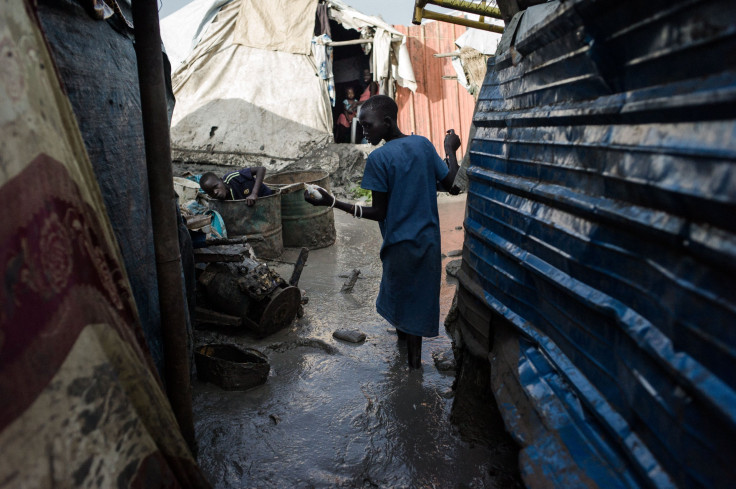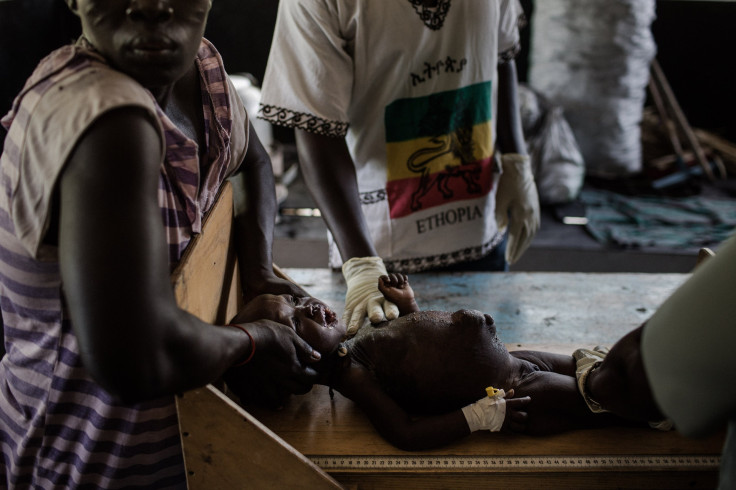Cholera Death Toll Rises In South Sudan: Why The World's Youngest Nation Is Failing To Thrive

Doctors in the neighborhood of Munuki in South Sudan’s capital Juba are busy counting the number of patients coming into their clinic with flu-like symptoms. They're trying to track the spread of cholera, a waterborne bacterial infection that can be fatal if left untreated. It's the second major outbreak to hit the world’s youngest nation -- but this time doctors and health officials say they might not be able to contain it.
"It's a race against time to prevent the spread of cholera up the river Nile, especially during the rainy season. Our priority right now is reaching the most vulnerable children who urgently need clean water and vaccinations," Jonathan Veitch, Unicef representative in South Sudan, said in a statement.
Treat, vaccinate, treat, vaccinate -- the World Health Organization and Doctors Without Borders remember last year's outbreak only too well -- and the mad scramble to stop the disease from spreading. Doctors repeated these steps until the number of cases started to decline. But the four-year-old government did little to improve clean water supplies for more than half a million people living in refugee camps.
Following the outbreak of civil war two years ago, 10,000 people have been killed and more than 1.6 million have been internally displaced, ensuring South Sudan stays one of the world's poorest countries. In June, the New York Times editorial board wrote that the landlocked country, which gained independence from Sudan in 2011, ranked "among the most astounding failures in Africa." Earlier this month the World Bank placed South Sudan back into the low-income least developed countries category, a bracket where per capita incomes are $1,045 or less. Nearly 8 million people out of a population of 11 million are facing severe hunger.

"This cholera outbreak is a wake-up call for the government and the aid world to redouble efforts to tackle a worsening cycle of misery," said Zlatko Gegic, director of Oxfam, in a recent statement. [Oxfam is a confederation of 17 organizations that fights poverty in dozens of nations.] "Money is urgently needed to fund an immediate surge in action to tackle the disease. The U.N.'s emergency aid appeal for the country is only 41 percent funded and without an extra injection of funds, and urgent action, deaths rates will only increase."
Recent studies show that a third of the population do not have access to safe water supplies. Locals rely on international humanitarian organizations to provide them with clean water -- but even groups like Doctors Without Borders and the United Nations are falling short, set back by constant fighting.
In June, Doctors Without Borders staff in Melut, one of the flashpoints of fighting in South Sudan, found their hospital and pharmacies looted and discovered the only system providing clean drinking water to the nearby refugee camp had stopped working. Staff members found that locals had been drinking dirty river water for three days.
The water sanitation issue in the country has not improved and local clinics lack the support to fight the disease. Without a concerted government effort to tackle the most fundamental hygiene issues, the disease will kill more people, international humanitarian groups say.
In South Sudan more than 1,200 people have been diagnosed with cholera since June and 39 people have died, according to the World Health Organization. The highly infectious disease has spread from Juba to the neighboring Jonglei state, which was one of the hardest hit areas of the country during the 19-month-long civil war.
Doctors Without Borders has since opened a cholera treatment center in Juba in response to the outbreak. The facility can hold up to 150 people and is staffed by 130 people from the local community to help treat patients.
South Sudan’s Ministry of Health declared the outbreak June 23, but doctors traced the first case of the disease to a United Nations refugee camp in Juba on May 18. The vast majority of cases are centered around Juba. Only one death was reported in Jonglei state in the city of Bor.
#SouthSudan - As of 15 July; 1,014 cholera cases, including 36 deaths, reported.
http://t.co/Ry4jqYm3vp via @WHO pic.twitter.com/fsUcwQVBvJ
— Brendan McDonald (@7piliers) July 18, 2015This year's cholera outbreak is another reminder that South Sudan is still far from stable. Earlier this year, it celebrated its fourth anniversary of gaining independence from the predominantly Muslim north. The civil war began in December 2013 when President Salva Kirr accused his former deputy of planning a coup, setting off a cycle of retaliatory killings that split the country along ethnic lines.
Four years after its birth, South Sudan is failing to not only keep its economy afloat, but also to prevent more people from dying from preventable diseases.
© Copyright IBTimes 2024. All rights reserved.





















